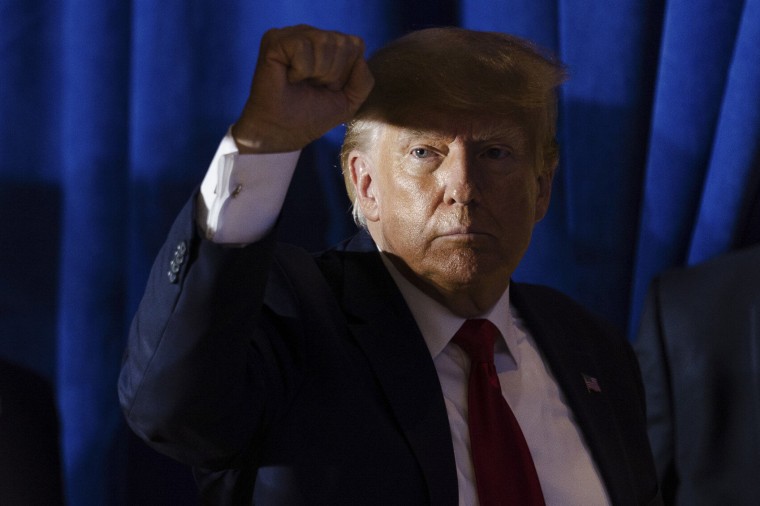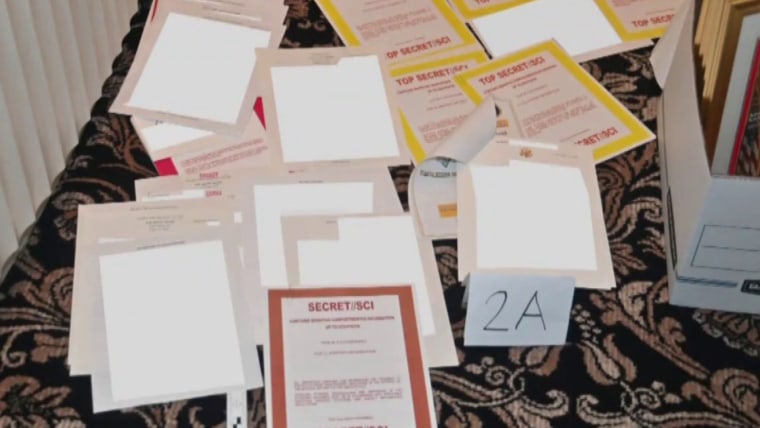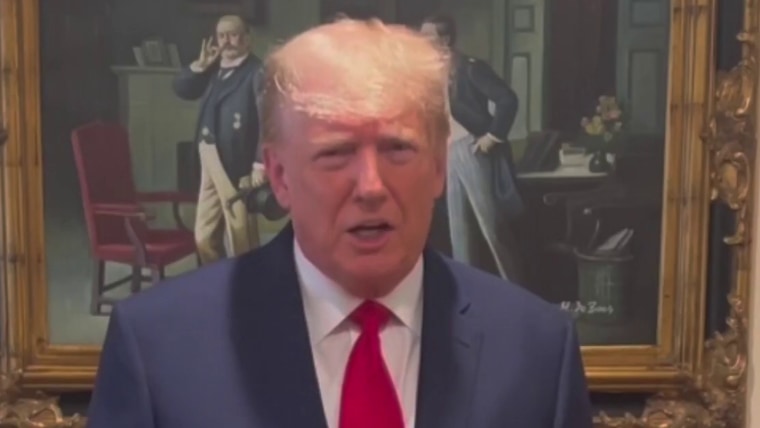[ad_1]
WASHINGTON — A federal grand jury has indicted Donald Trump on seven criminal charges in connection with his mishandling of more than 100 classified documents that were discovered last year at his Mar-a-Lago resort in Florida, making the twice-impeached former commander-in-chief the first former president to face federal criminal charges.
Trump said Thursday night that his attorneys were informed that he’s been indicted in the special counsel’s investigation into his handling of classified documents. Two sources familiar with the matter confirmed the indictment, with one added that the former president has received a summons to appear in U.S. district court on June 13.
In a post on his social media platform Truth Social, Trump said: “The corrupt Biden Administration has informed my attorneys that I have been Indicted, seemingly over the Boxes Hoax.”
Follow along for live updates
Two sources briefed on the seven charges told NBC News the charges include false statements and conspiracy to obstruct. All charges are related to retaining documents and obstructing justice. One source notes that 7 charges doesn’t necessarily mean 7 counts-there can be multiple counts associated with each charge.
The nature of the charges was first reported by The New York Times.
A spokesperson for the special counsel declined to comment.
A source familiar says the indictment is under seal, which is why the government cannot comment.
A search warrant for his Mar-a-Lago property in August said investigators were searching for evidence of three crimes involving the mishandling of sensitive government records, including whether they were shared with “unauthorized” people. Justice Department attorneys had since raised the prospect of an obstruction-related crime in court filings.
Minutes after Trump announced he’d been indicted on Truth Social, he sent out a fundraising appeal citing the criminal charges.
“The Biden-appointed Special Counsel has INDICTED me in yet another witch hunt regarding documents that I had the RIGHT to declassify as President of the United States,” the fundraising email said, asking supporters to “make a contribution to peacefully stand” with him.
He later posted a four-minute video on Truth Social where he said he’s “an innocent man” and called the probe “a hoax.”
“I’m an innocent person,” he said. “I did nothing wrong. And we will fight this out just like we’ve been fighting for seven years. It would be wonderful if we could devote our full time to making America great again.”
The decision by the grand jury is the culmination of a months-long Justice Department investigation now led by special counsel Jack Smith, who was appointed by Attorney General Merrick Garland.
Smith, who was appointed in November 2022 after Trump announced his 2024 run for the Republican nomination, took over existing investigations into Trump’s handling of classified documents found at Mar-a-Lago home as well as “key aspects” of the Justice Department’s investigation into the Jan. 6 attack on the Capitol and efforts to obstruct the peaceful transfer of power.
Some of Trump’s fellow Republican presidential candidates and congressional allies blasted the charges as politically motivated.
One of Trump’s presidential rivals, Vivek Ramaswamy, said in a statement that “I never thought we would see the day when the U.S. President deputizes the DOJ to arrest his lead rival in the middle of an election.” He reiterated his vow to pardon Trump if he’s elected president.
Rep. Troy Nehls, R-Texas, tweeted of the news, “We live in a Banana Republic.”
The White House declined to comment on the indictment.
Trump is facing several other investigations. He was separately charged in early April by Manhattan District Attorney Alvin Bragg with 34 felony counts of falsifying business records related to his alleged role in hush money payments toward the end of his 2016 presidential campaign. He pleaded not guilty in that case. Trump is also facing a criminal investigation in Georgia related to the 2020 election.

After Trump left office in January 2021, the federal government made multiple attempts to obtain files Trump had kept from his time in the White House and gave the former president and his legal team several opportunities to hand them over.
The government eventually seized more than 11,000 pages of government documents from Mar-a-Lago, including more than 100 classified documents, after the former president’s team attested that they had done a thorough search for classified documents at the location.
Trump has denied doing anything wrong, rebuffing allegations that he mishandled classified documents by claiming that he had already declassified them.
He has also equated his situation to President Joe Biden, who was also found to be in possession of classified documents from the Obama administration. But the circumstances are much different.
The catalyst for the investigation of the documents came in early 2022 when Trump returned 15 boxes of White House documents from Mar-a-Lago to the National Archives and Records Administration. The Presidential Records Act mandates that all presidential records must be properly preserved by each administration and transferred to the National Archives at the end, and the Archives had repeatedly asked Trump’s team to turn over documents it believed were missing, according to government court filings.
After receiving the boxes in January of last year, Archives found that they included classified material that were haphazardly mixed in and asked the DOJ to review whether Trump’s handling of the records violated federal law.
Their review found 184 unique documents that had classification markings in the boxes, including 25 documents marked as “TOP SECRET,” 67 documents marked as “confidential” and 92 marked “secret.”
Archives asked Trump’s team to make sure there weren’t any more documents, and a federal grand jury in May 2022 issued a subpoena to Trump demanding the return of all documents with classified markings in his possession.
Trump’s lawyers turned over some additional documents with classified markings to the feds in early June of last year, along with a certification from the attorneys that following a “diligent search” all sensitive records that had been in Trump’s possession were now returned.
But the FBI indicated in an affidavit, according to a heavily redacted version that was later released, that it had learned of evidence that suggested Trump didn’t comply with the subpoena and had not turned everything over to the federal government.
That affidavit was then used to justify the Aug. 8 search of Mar-a-Lago by FBI agents who recovered a trove of additional top secret and other highly classified documents, court documents unsealed by a federal judge said. During that search, which Trump called a “raid,” federal agents removed 11 sets of classified documents, including some that were labeled secret and top secret. Among the items the FBI took were a handwritten note, information about the “President of France,” an executive granting of clemency for Trump ally Roger Stone and binders of photos. There were also papers described as “SCI” documents, which stands for highly classified “sensitive compartmented information.”
Later that month, the DOJ said that it had evidence that classified documents found at the Mar-a-Lago estate were “likely concealed and removed” before the FBI search to retrieve them. The department said it had gathered evidence “that efforts were likely taken to obstruct the government’s investigation,” with government records “likely concealed and removed” in the months leading up to the search.
For months after the search, Trump and his attorneys made an effort to block the federal government from carrying out its investigation independently. A special master was appointed to review the seized documents, Senior U.S. District Judge Raymond J. Dearie of New York, who expressed doubt that Trump had actually declassified the records found. But the Supreme Court ultimately rejected Trump’s request last October that Dearie be allowed to review the classified papers.
Much of the investigation into Trump’s handling of classified documents took place in front of a federal grand jury in Washington. Former Trump national security adviser Robert O’Brien was subpoenaed in February, and Trump lawyer Evan Corcoran testified in March as a result of a court order. More recently, the action shifted to a federal grand jury seated in Miami, Florida, where Trump aide Taylor Budowich appeared on June 7.
Trump has maintained he didn’t do anything wrong, and claimed that he was entitled to keep the documents.
[ad_2]
Source link


